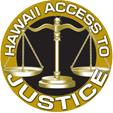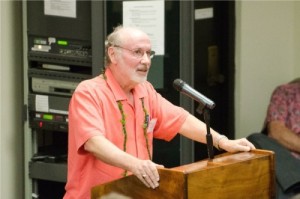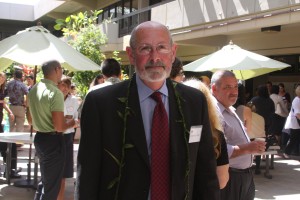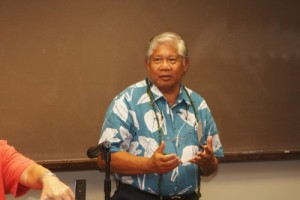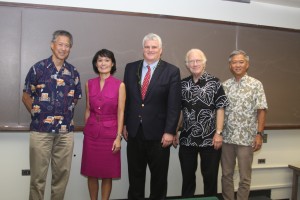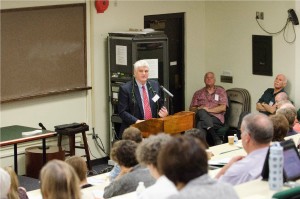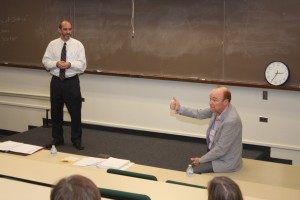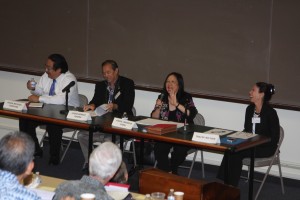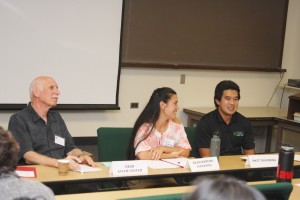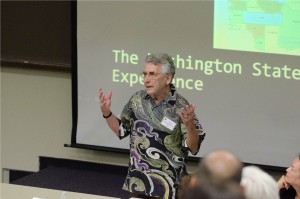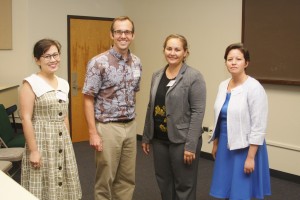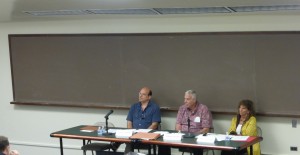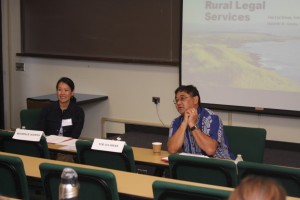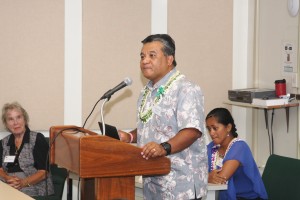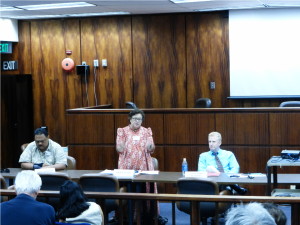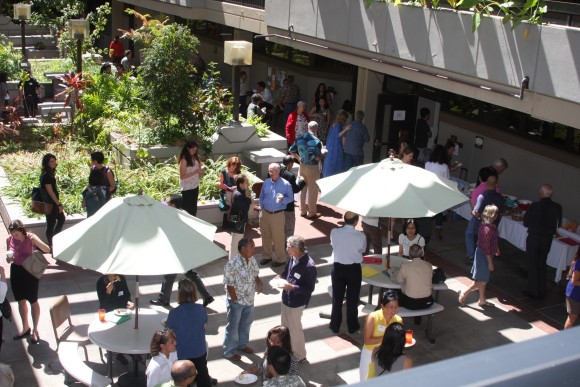
2015 HAWAII ACCESS TO JUSTICE CONFERENCE
Sponsored by the Hawaii Access to Justice Commission
Approximately 260 people attended the seventh Access to Justice Conference with the theme, “Narrowing the Justice Gap” on Friday, June 19, 2015 at the William S. Richardson School of Law, University of Hawaii.
The Cades Foundation was acknowledged for its generosity in providing a grant to assist in defraying the costs of the conference. Rhonda Griswold and Larry Takumi, trustees of The Cades Foundation, were in attendance at the conference.
In his welcoming remarks, Hawaii Supreme Court Chief Justice Mark E. Recktenwald stated:
One of the greatest challenges to equal justice today is the lack of effective access to our civil justice system. The reason is simple–people who have low or even moderate incomes cannot afford to hire an attorney to represent them in their civil legal cases. Although there are legal services providers like the Legal Aid Society of Hawaii who do an amazing job representing indigent clients, they have nowhere near enough resources to meet the need. As a result, every year in Hawaii, thousands of people must represent themselves in our civil courts, trying to navigate a system that is foreign to the average layperson. Many of them simply give up.
Ensuring that every person’s voice is heard when their legal rights are threatened is not a luxury–rather it is at the very foundation of the legitimacy of our courts, and therefore, our democracy. We are talking about fundamental human needs–housing, health care, the ability to participate in raising one’s child. When these decisions are made without hearing every side of the story, the promise of justice for all rings hollow . . . .
Hawaii’s work on access to justice issues is being noticed across the country. Last year, the National Center for Access to Justice completed an independent study of each state justice system across the country. Hawaii was ranked among the top five for expanding access to justice. We were rated number one for providing services to litigants who represent themselves and tied for first in providing support for people with disabilities. I’m very proud of what this says about the strength of the access to justice movement here in Hawaii, and I am grateful for all the hard work it represents. . . .
Although increasing access to justice is the right thing to do, it also makes good business sense. Throughout the country, economic value studies have shown that increased provision of legal services to those of low and moderate incomes benefits not only those individuals, but also the economy. Studies are showing that the time and money invested pays off at an exceptional rate: a New York study suggested there was a $5 return to the economy for every dollar spent on civil legal services.
Why is that return so high? There are a number of reasons. Legal aid makes neighborhoods safer and more stable and desirable. It reduces the number of abused and elderly who require emergency services and subsequent follow-up social services, thereby reducing the costs of those services for taxpayers. It brings federal monies into the state through assisting those in need with disability claims. Legal aid saves jobs by helping families obtain the right services for their children, leading to a more stable workforce. We need to find ways to convey this message and build more partnerships.
Commission Chair Daniel R. Foley presented his personal story and described his volunteer work as a Peace Corps volunteer in South Africa in 1969. When the country erupted in a civil war, he was labelled a communist and expelled. He visited Micronesia and stayed for eight years helping with the writing of constitutions and statutes and other governing documents. “Sharing was part of the culture,” he said.
When he returned to Hawaii, Judge Foley joined ACLU as a staff attorney and he remembers that his first big case involved the prison system and its condition. Without that lawsuit, prison conditions would not have improved, he stated. Later in December 1990, several same sex couples wanted to obtain marriage licenses and were refused. “I told the clients not to expect much,” said Judge Foley, “because no laws at that time were favorable.” Judge Foley was successful in the Baehr case and so commenced the societal change. He treasures his pro bono work and recommends it strongly.
In his keynote address, “Narrowing the Gap: Access to Justice in Today’s Realities,” Jonathan D. Asher, who is the Executive Director of the Colorado Legal Services, said:
In Colorado, as here in Hawaii, the Supreme Court and the judiciary have been leaders in improving the justice system for those in need. In Colorado, the Supreme Court has mandated the acceptance by local courts of state approved uniform forms essential to efforts to systematize materials for pro se litigants and the training of pro bono attorneys willing to help those in need. The Colorado Supreme Court has simplified many court proceedings. The Court has adopted rules to facilitate and support discrete task unbundled representation, and when the rules were not widely used, the Court revised them again, easing a lawyer’s withdrawal after the limited service was provided, making withdrawal automatic, in the hope that more lawyers would start to provide limited scope service . . . .
Let me interject that many of these initiatives were heavily criticized by members of the Bar, as anything new will be. Some believe that judicial leadership on equal justice issues conflicts with judicial neutrality, that judges should sit back and not advance any cause. As Laurence Tribe, the first Senior Counsel for Access to Justice at the U.S. Department of Justice said in 2010, ” . . . there is a basic and often ignored difference between neutrality and judicial inactivity, between judicial objectivity and judicial passivity.” He shared that:
Perhaps the greatest image we can conjure of a wise judge is that of Solomon. We all remember his creative, pre-DNA test, solution to the problem of adjudicating the contested issue of maternity between two women making competing parental claims to the same infant. The wise king’s proposed solution, which he sprang on the women when he suggested splitting the baby in two while he watched the reactions of both claimants to motherhood, was the very essence of neutrality and objectivity.
but, Tribe said, “it was hardly passive. It was as active as all-get-out. Solomon’s wisdom sprang from making justice an active verb.”
I encourage all of you, members of the Court, the judiciary, the Bar, the Law School, and those of you who simply care about these issues, to be as active as all-get-out.
But I don’t think that being active is enough. I encourage you, in your efforts to expand access to justice, to reflect on the difference between access to justice and justice itself . . . .
We should not accept that what, I fear, is increasingly two tiers of justice–one for those who can afford counsel and another for those who can’t.
I will feel that things are more equal when we tell the CEO of a major corporation that you are pretty bright, you speak English well, so you should go to a website and it will walk you through how to fill out a form and respond to the other party’s patent infringement or trademark claim. No. Only those without means are triaged and told that legal information and an interactive website is all that you will get. Some may make the choice that that is all that they need or want–just information. But while that is fine for those who chose it, we should not accept it for those who have no choice, when we make the choice for them.
Of course, 100% of those in need should get something, but the goal isn’t something–the goal is justice–not just access to the courts–opening the door to the courthouse. As Chief Justice Lippman of New York said, there is no point in opening the door if you can’t get justice once you are inside–the goal is not increasing judicial efficiency, it is ensuring the right response to someone’s legal need, it is the pursuit of justice, not just access.
Technology is a helpful tool, but it is not the end, it is not justice. A computer can, if programmed well and used wisely, help move us in that direction, as it should, but that is all it can do.
We need to test, and then implement, new and broader strategies, beyond just additional resources for legal aid programs–as important as that is–we must help meet the full range of legal needs of low-income people and communities and that those needs, whether within or outside of the court system, should be considered and addressed . . . .
A Greek philosopher, when asked when justice would come to Athens, stated that justice would only come when those who are not injured are as indignant as those who are. I believe that I am in the company of the indignant and that Hawaii will be well served by your thoughtful concern and indignation.
There were two concurrent morning workshops. Chief Justice Recktenwald led the “Engaging the Business Community in Access to Justice” workshop with Robbie Alm, president, Collaborative Leaders Network; Gregory R. Kim, Convergent Law Group, LLP; Catherine Ngo, president and chief executive officer, Central Pacific Bank; and Hoyt H. Zia, senior vice president, general counsel and corporate secretary, Hawaiian Airlines, Inc.
Tracey Wiltgen, executive director, The Mediation Center of the Pacific, led the other morning workshop, “What’s Mediation Got to Do with Access to Justice?” Joining her in this workshop were Judge Ronald Ibarra, Judge Jennifer Ching, and Judge Michael Tanigawa.
There were five concurrent workshops for the first afternoon session:
1. “More Than Just Interpreting Words! (Cultural Linguistic Barriers for Micronesians to Access Justice)” with Jean Johnson, Dr. Sheldon Riklon, and Beverlyn Simina.
2. “Using Non-Attorneys to Close the Justice Gap” with R. Elton Johnson, III, Robert LeClair, and Nanci Kreidman.
3. “Access to Justice for Individuals with Neurocognitive Disorder (Dementia) and Their Caregivers” with Dr. Iqbal Ahmed and Professor James Pietsch.
4. “Delivering Pro Bono Services to Rural Communities (includes providing legal assistance for natural disaster relief)” with Michelle Acosta and Tim Lui-Kwan.
5. “Access to Justice for Juveniles and Foster Children” with Judge R. Mark Browning, Mark Patterson, and Laurie Tochiki.
For the second part of the afternoon there were another five concurrent workshops as follows:
6. “Lack of Representation for Non-English Speaking Residents” with Calleen Ching and Gary Singh.
7. “Landlord-Tenant, Homeless, and Other Housing Issues” with Camille K. Kalama, Jenny Lee, Sharla Manley, and Gavin Thornton.
8. “Technology and Access to Justice” with Judge Don Horowitz (ret.), Nalani Fujimori Kaina, and Sherrie Seki.
9. “Incubator Projects and Loan Assistance Programs” with Avi Soifer, Matt Tsujimura, and Keani Rawlins-Fernandez.
10. “Bankruptcy Law and Consumer Debt Issues” with Johnathan Bolton and David Farmer.
The closing panel focused on “Narrowing the Justice Gap” with Chief Justice Recktenwald, Judge Foley, Jon Asher, and Associate Justice Simeon R. Acoba, (ret.), as moderator, with a discussion on ways that unmet needs can be reached outside of the courtroom door by the Judiciary and by the Commission; not losing sight of achieving justice in efforts to improve access to justice, that is, to the courts; and possible priority initiatives for the future.
The 2015 Access to Justice Conference sponsored by the Hawaii Access to Justice Commission was another successful event.
Speeches:
Welcoming remarks of Chief Justice Recktenwald
“Narrowing the Gap: Access to Justice in Today’s Realities” by Jonathan D. Asher
“Bankruptcy and Consumer Debt” workshop:
Outline of the Bankruptcy and Consumer Debtor Workshop
Other workshop summaries:
Summary of the Business Community Workshop;
Summary of the Mediation Workshop;
Summary of the “More than just interpreting words” Workshop;
Summary of Juvenile Justice Workshop;
Summary of the Dementia Workshop;
Summary of Rural Pro Bono Workshop
